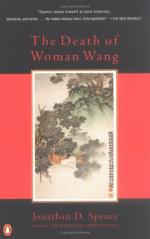|
This section contains 949 words (approx. 3 pages at 400 words per page) |

|
Chapter 2, The Land Summary and Analysis
Huang, the magistrate tells a story, or a report, about a heavy snowfall in 1671, that freezes people to death in T'an-ch'eng. Yet, the snowfall is not a big enough disaster to lessen the tax burden to Peking, the capital of the Chinese Empire. Winter wheat and kaoliang (also known as sorghum) are the main crops here. Other crops grown are millet, soybean, and other vegetables and fruits. Farming can be difficult, since rain is sometimes too little or too much, causing flooding. Draft animals are used to plow, or else men have to do it. Human and animal wastes are used as fertilizer. The farmers are kept busy, first in October, when they are planting the winter wheat. Later, the soybeans are planted. The big pressure is to pay taxes to the central government. The population of...
(read more from the Chapter 2, The Land Summary)
|
This section contains 949 words (approx. 3 pages at 400 words per page) |

|




